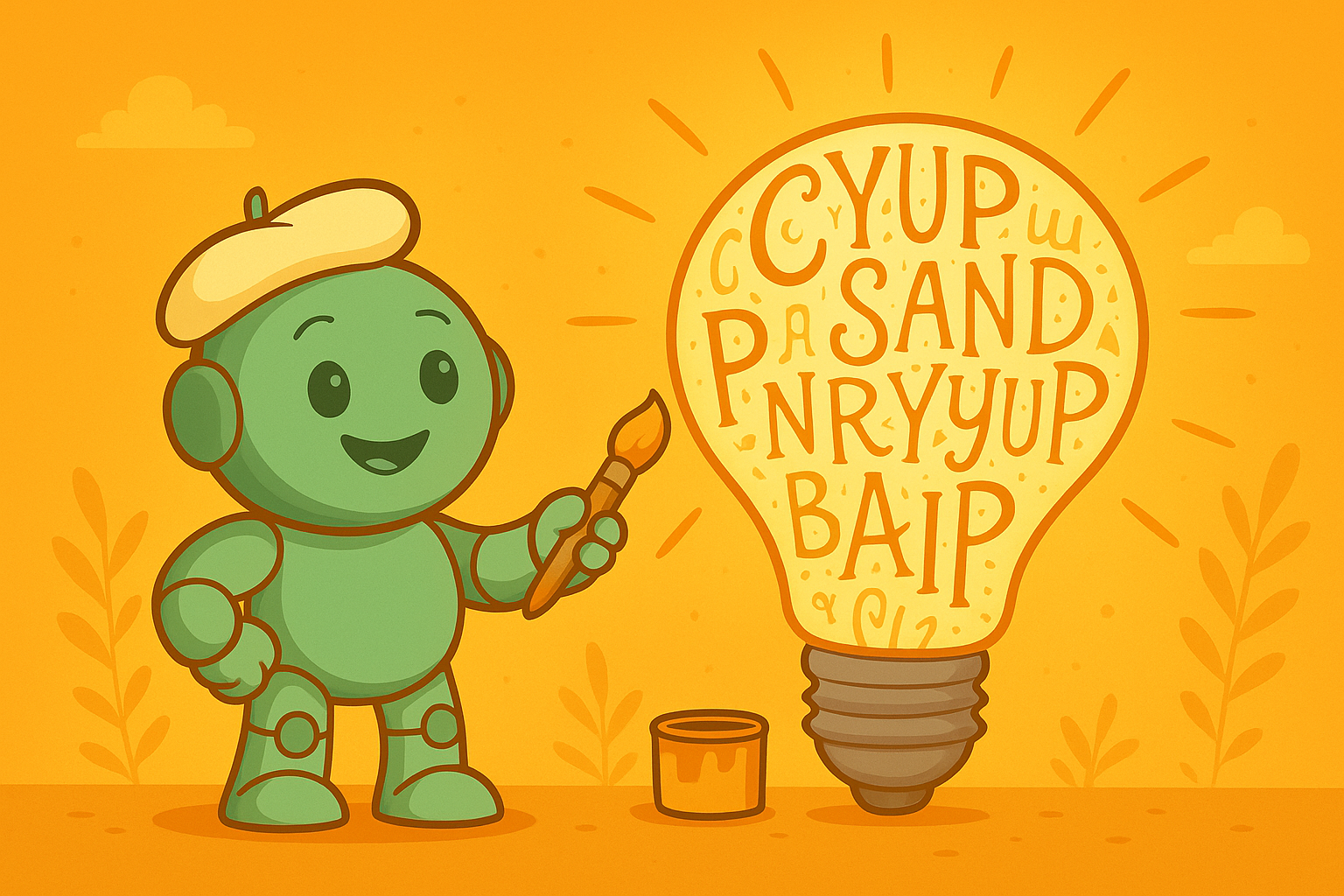How to Create a Stage Name That Defines Your Brand
So, you need a stage name. The goal is to land on something that’s memorable, brandable, and doesn’t get you confused with a dozen other performers. A great name captures your artistic vibe and makes you easy for fans to find online. This isn't just about picking something that sounds cool; it's a mix of creative brainstorming, smart testing, and a little brand strategy.

Why Your Stage Name Is Your Most Important Asset
Before you even start brainstorming, it's crucial to grasp why this matters so much. A stage name is far more than just a substitute for your real one; it's the foundation of your entire artistic brand. It shapes how people see you, builds your professional credibility, and helps forge a persona that sticks.
Think of it this way: your name is the title of your career's story.
A well-chosen name can telegraph your genre, your attitude, and your entire style in just a few syllables. "Slash" just sounds like a raw, virtuosic rock guitarist. "Lana Del Rey" immediately brings to mind a certain cinematic, vintage Americana vibe. The best names feel like they were always meant to be.
The Foundation of Your Brand
Your name is the very first thing fans, booking agents, and industry gatekeepers will encounter. It’s what makes them decide whether to click, listen, or learn more about you. A weak or confusing name puts up a wall right away, but a strong one can open doors you didn’t even know were there.
Here’s how it breaks down:
- Audience Perception: A name can paint you as professional, quirky, serious, or fun before anyone ever hears a single note or sees you perform.
- Memorability: If people can't remember your name, spell it, or say it out loud, they can't look you up on Spotify, find you on TikTok, or Google you. It's that simple.
- Professional Identity: It also creates a healthy and necessary boundary between your personal life and your public career.
To help crystallize these ideas, here's a quick reference table breaking down the essential qualities of a powerful stage name. Think of these as your core principles as you start your search.
| Element | Why It's Important | Real-World Example |
|---|---|---|
| Distinctiveness | Stands out in a crowded market and avoids confusion with other artists. | The Weeknd (unique spelling) |
| Memorability | Easy for fans to recall, spell, and share with others. | Drake |
| Brand Alignment | Reflects your artistic persona, genre, and overall style. | Childish Gambino |
| Online Availability | The name (or a close variation) is available for social media and a domain. | Billie Eilish |
| Pronounceability | People can say it easily, which helps with word-of-mouth marketing. | Post Malone |
Having a solid name that ticks these boxes gives you a massive head start. It’s not just about vanity; it’s about giving your art the best possible chance to connect with an audience.
This isn’t a new concept, either. Adopting a professional name is a time-honored tradition in the arts, as you can see in this screenshot from Wikipedia's entry on "Stage name".
Artists have been crafting new identities for centuries. Legends like David Bowie (born David Jones) and Bob Dylan (born Robert Zimmerman) changed their names to stand out and embody their artistic vision. Elton John (born Reginald Dwight) took it a step further and legally adopted his stage name, showing just how deeply an artist can connect with their chosen identity. If you're curious, you can find more historical examples of stage names and their origins on Wikipedia.
Creative Brainstorming for a Name That Sticks

Before you can find the right name, you have to find a lot of names. The first part of this process is all about creative chaos. Give yourself permission to be messy and just generate a massive, judgment-free list of possibilities. Don't worry about perfection yet. Right now, the goal is quantity over quality because you need a rich pool of ideas to refine later.
This is where you dig deep to find options that feel genuinely authentic. Instead of jumping straight to a generator, start with what makes you, well, you.
Mine Your Personal Story
Your own background is a goldmine for original ideas. A name with a built-in narrative feels more real because it is real. Start exploring the different facets of your life, moving from the obvious to the obscure.
Here are a few places I always tell people to start looking:
- Family Heritage: Look at old family names, especially maiden names or names of distant, interesting relatives. A unique surname from your family tree can add a touch of history and distinction.
- Childhood & Memories: What was your first pet's name? The street you grew up on? A favorite childhood toy or a cherished nickname can often spark a surprisingly fitting idea.
- Passions & Interests: Draw inspiration from your favorite books, historical figures, mythological characters, or even scientific concepts. What moves you outside of your art?
Key Takeaway: The most resonant names often have a personal story behind them. They aren't just cool-sounding words; they're extensions of your identity that connect your past experiences with your future artistic persona.
Play with Words and Sounds
Once you have a few core concepts, it's time to play. This is my favorite part. Word association and literary devices are fantastic for transforming a basic idea into something memorable. Try experimenting with alliteration, assonance, or even putting two contrasting words together.
Let’s say "Rose" is a family name you like. You could explore variations like "Rosa Wilde" or "Iron Rose." This isn't about following a formula; it's about exploring the connections and sounds that feel right. If you get stuck, you can always look beyond the obvious for naming inspiration.
This practice is incredibly common. In fact, roughly 30-40% of high-profile entertainers in the US and UK use a professional name. Take Bruno Mars, born Peter Hernandez; he chose his name to avoid being stereotyped. Or Lady Gaga, born Stefani Germanotta, who found her iconic name in a Queen song, which helped create a clear line between her public persona and private life. It’s fascinating to discover more about why celebrities adopt new names on stacker.com.
How to Stress-Test Your Top Name Choices
So, you've got a shortlist of names that feel right. That's a huge step. But a name that looks brilliant on paper still needs to survive contact with the real world. Now comes the critical part: putting those top contenders through the wringer.
This vetting process is what separates the pros from the amateurs. It’s the step that prevents you from having to do an awkward and expensive rebrand a year or two down the line when you discover a fatal flaw. Trust me, I’ve seen it happen.
Think of it as a gauntlet. Only the strongest name will make it through to the end. This simple flow gives you a visual for how to narrow down your list until you have a final, battle-tested choice.
As you can see, it’s not just about what you like. A great name has to pass multiple checks, from being easy to find online to sticking in people's minds. Let's break down how to do that.
The Digital Gauntlet
In this day and age, if you don't exist online, you don't exist. Your stage name has to be discoverable. For every single name on your shortlist, you need to run these essential digital checks. No exceptions.
-
The Google Test: This is non-negotiable. Search for your potential name using quotes (like
"Misty Midnight"). What pops up? If the first page is dominated by a huge corporation, another artist in your genre, or something... well, embarrassing, that's a serious problem. Getting buried on page ten of Google is a death sentence for discoverability. -
The Social Media Test: Check for the handle on the platforms that actually matter for your career. Think Instagram, TikTok, YouTube, or whatever is relevant to your field. If
@YourNameis already taken, see if a clean, professional variation is available, like@YourNameMusicor@TheRealYourName. Avoid a bunch of random numbers or underscores if you can help it. -
The Domain Test: Your website is your digital home base. You need to own your address. See if the .com domain is available for your name. Yes, there are other options like
.netor.art, but the .com is still the gold standard. It conveys instant credibility and is what people will type in by default.
The Human Element Check
Okay, so the name passed the digital sniff test. But how does it work in the real world—you know, with actual people? This is where you run the classic "Radio Test."
Picture this: a DJ on the radio or a host on a podcast gives you a quick shout-out. They say your name once. Could a listener, hearing it for the first time, easily remember it? Could they spell it well enough to find you online later?
A name that’s hard to pronounce or spell creates friction. Every time someone has to ask, "How do you spell that?" you lose a potential fan. The goal is to make it effortless for people to find and share your work.
Alright, let's take that solid foundation and give it a more human, expert touch. Here’s a revised version that sounds like it’s coming from someone who’s been through this process before.
Is Your Name Legally Up for Grabs?
You've landed on a name that feels like you. It passed the Google test, your friends love it, and it just rolls off the tongue. But before you print the merch and book the tour, there's one crucial step left: the legal check.
This part can feel a bit daunting, but ignoring it is one of the biggest mistakes an emerging artist can make. Securing your artistic identity isn't just paperwork; it's about protecting your future.
Simply performing under a name does grant you some minimal, local protection—what lawyers call a "common law" right. Honestly, though, that won't hold up if you plan on having a career beyond your hometown bar circuit. For real protection, you need to think about trademarks.
So, What Exactly is a Trademark?
A trademark isn't just about owning a name. It's about owning your brand identity within your industry. It legally links your stage name to your work—be it live shows, recorded music, or merchandise.
This is what stops another artist from popping up with a confusingly similar name and riding your coattails. Think of it as putting a legal fence around your professional territory.
A registered trademark gives you exclusive rights to use your name across the country for entertainment. It elevates your stage name from a cool alias to a genuine, protectable asset. This is your green light for building a real brand.
Before you get too attached, you have to do some digging. A great starting point is a preliminary search on an official database. If you're based in the US, the United States Patent and Trademark Office (USPTO) has its TESS database, which is the perfect place to start. A quick search there can reveal if another performer has already staked a claim on your name.
To give you a clearer picture, let's break down the different levels of protection you can have for your stage name.
Stage Name Protection Levels
| Protection Level | What It Means | When It's Recommended |
|---|---|---|
| Common Law Use | You get informal rights simply by using the name in your local area. Protection is very limited. | Fine for hobbyists or artists just starting out in their local scene. |
| State Trademark | Formal registration with your state government. Offers stronger protection, but only within that state's borders. | A good middle ground if you have a strong regional following but aren't touring nationally yet. |
| Federal Trademark | The gold standard. Registered with the federal government (like the USPTO), giving you nationwide rights. | Essential for any serious artist planning to release music, tour, or sell merch nationally. |
As you can see, the right level of protection really depends on your career ambitions.
When to Call in a Professional
While you can (and should) do your own initial searches, trademark law is notoriously tricky. For a deeper dive into the specifics, this guide to legal compliance in naming is a fantastic resource to get your head around the rules.
I always recommend bringing in an entertainment or trademark lawyer. It's time to make that call if:
- You find a name that seems a little too close for comfort during your search.
- You're serious about filing an official trademark application.
- Things are taking off—you’re booking bigger shows, planning a release, or getting press.
Yes, it's an investment. But a good lawyer can run a comprehensive search that you simply can't do on your own and will handle the entire application process. Trust me, spending a little now can save you from a world of legal pain and the nightmare of having to rebrand after you've already built a following around the name you worked so hard to create.
Launching Your New Artistic Identity
You've done the hard work and picked the perfect name. That's a huge milestone, but now it's time to bring that name to life. A stage name is just a collection of words until you launch it with purpose and wear it with confidence. The rollout is your chance to introduce your new artistic self to the world—and you want to do it right.
Your first practical step is to claim your digital territory. This means systematically updating every single place your audience can find you. I always recommend making a simple checklist so nothing gets missed.
- Social Media: Change your handles and display names on Instagram, TikTok, X, Facebook, etc.
- Music Platforms: Update your profiles on Spotify, Apple Music, Bandcamp, and SoundCloud.
- Your Website: This is your home base. Update your domain, "About" page, and all mentions of your old name.
- Other Platforms: Don't forget about YouTube, your EPK (Electronic Press Kit), and any other online presence.
Getting this done all at once creates a clean, unified brand from the very beginning.
Embodying Your New Persona
Beyond the digital housekeeping, the real shift is a personal one. You have to start being your new name. This is where it starts to feel real. Introduce yourself with your stage name at industry events, use it in interviews, and own it completely during your performances. It will likely feel a bit awkward at first, but that feeling fades. Stick with it.
The goal is for your stage name to become second nature. When someone asks who you are, your new identity should roll off your tongue without a second thought. That's when you truly own it.
This move from a private person to a public professional is a huge motivator for artists. In fact, branding and economic advantages are the main reasons 60-70% of new artists create a stage name in the first place. While it certainly boosts memorability and marketability, it's worth noting that about 25% of performers feel a little conflicted about the change. You can find some interesting perspectives on the pros and cons of stage names in the entertainment industry on themagiciansforum.com.
Making that final commitment can feel daunting, but it's a vital step forward. If you're still wrestling with the decision, our article on how to decide on a name can offer some extra guidance. Your new name is the banner you'll carry throughout your career—so launch it proudly.
Common Questions About Choosing a Stage Name
Picking a stage name brings up a lot of questions, and frankly, a lot of uncertainty. It feels like a huge decision, and you want to get it right. Let's walk through some of the most common hurdles I see artists face when trying to create a stage name and nail down their identity.
Can I Just Use My Real Name?
Of course you can. Plenty of incredible artists, from Florence Welch to Frank Ocean, perform under their given names or a slight tweak. There's a real power in that authenticity.
The big question isn't if you can, but if you should. The real test is whether your name is distinct enough to cut through the noise. If your name is "John Smith," you’re signing up for a tough fight for search engine rankings and social media handles. But if you were born with a name that’s unique, memorable, and available online, it can be a fantastic and genuine choice for your career.
Do I Need to Legally Change My Name?
Nope, definitely not. For the vast majority of performers, this isn't necessary. Most artists keep their legal name for all the behind-the-scenes stuff—contracts, banking, taxes—and use their stage name for everything public.
Legally changing your name is a serious personal decision, not a professional prerequisite. It's a move some artists, like Elton John, made much later in their careers, often as a way to fully embrace their public persona. It's not a hoop you need to jump through when you're just getting started.
Key Insight: Think of your stage name as a brand asset, not a legal requirement. Your energy is better spent building recognition around that name and securing it with a trademark, not changing your birth certificate unless you have powerful personal reasons to do so.
What If My Ideal Name Is Already Taken?
This happens all the time, and it's a frustrating but solvable problem. The first thing to figure out is who has it. If an active artist in your genre is already using the name, my advice is to walk away. It will save you from audience confusion and potential legal headaches down the road. It's just not worth it.
But what if it's just a social media handle that's snagged? That's when you can get a little creative. Let's say "ArtVandelay" is taken. You can try adding a simple, professional-sounding modifier.
- ArtVandelayMusic
- OfficialArtVandelay
- TheArtVandelay
The key is to find a clean variation that you can lock down across all platforms. A consistent online presence is what really matters.
How Soon Should I Start Using My Stage Name?
Immediately. The second you've done your homework and feel solid in your choice, start rolling it out. Consistency is crucial for building that all-important recognition with your audience.
Your first move should be securing the website domain and social media handles. From there, update your profiles on Spotify, Apple Music, and anywhere else your work lives. The moment you step on stage or release new material, your stage name should be the only professional name people see.
Ready to find that perfect name? The tools at NameRobot are designed to help you brainstorm ideas, check what's available, and analyze your top contenders. We help turn the challenge of naming into a genuinely inspiring part of your creative process. Start discovering your new identity at https://namerobot.com.















